SXSW
SXSW 2015: Elizabeth's Focus on Female Filmmakers Leads Her to DuVernay, Prince-Bythewood

I took the Monday of SXSW off work as soon as I heard Gina Prince-Bythewood was scheduled to appear that day. This was the first SXSW I was drawn to attend any of the conference events at the festival -- usually I just stick to the movies. But getting to hear the director of Beyond the Lights (including one of my favorite performances of the year) speak a couple days after director Ava DuVernay was to deliver a keynote seemed like too much goodness to pass up.
On Saturday, I arrived two hours early for DuVernay's keynote, assuring myself a spot on the (side) front row. My friend Christina and I chatted with other folks in line, talked about other films on our schedule and spied actor Stephen Root walking past the line as the time grew near.
Hearing DuVernay speak was relevatory. You can view her speech below:
SXSW Review: Rolling Papers
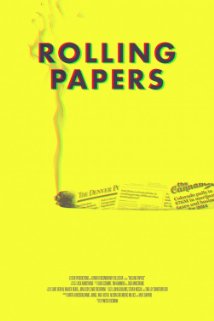 I'm a lifelong non-smoker, and marijuana holds no interest for me, so Mitch Dickman's documentary Rolling Papers would be one of the least likely SXSW screenings to find me in its audience. However, I make a point every year to join friends for at least one or two screenings that I would never have selected myself. It's a great (non-chemical) way to expand the mind, you know? These excursions outside my comfort zone frequently pay off, and the fact you can walk into almost any film at this festival and enjoy yourself is a testament to the SXSW programming staff.
I'm a lifelong non-smoker, and marijuana holds no interest for me, so Mitch Dickman's documentary Rolling Papers would be one of the least likely SXSW screenings to find me in its audience. However, I make a point every year to join friends for at least one or two screenings that I would never have selected myself. It's a great (non-chemical) way to expand the mind, you know? These excursions outside my comfort zone frequently pay off, and the fact you can walk into almost any film at this festival and enjoy yourself is a testament to the SXSW programming staff.
Rolling Papers can be considered as nothing but a complete success. The film is informative, focused and entertaining, generating interest in me for a topic I find generally unappealing. Dickman chose, wisely, to make his film not about recreational marijuana, its legalization in Colorado, or politics -- all tired subjects which have been covered extensively. Instead, his camera is witness to the birth of a ground shift in news coverage.
As newspapers around the country are in the process of closing their doors, the Denver Post takes a chance and assigns entertainment editor Ricardo Baca to create a new section, from the ground up, covering all things pot-related. In short order The Cannabist, as the online section is so cleverly named, is generating publicity, increasing subscriptions and raising eyebrows.
In addition to Baca, Dickman interviews Post editor Greg Moore and Cannabist staff writers including columnist John Wenzel, Jake Browne (reviews) and Brittany Driver (parenting). He also turns a lens on reviewer and photographer Ry Prichard who has distinguished himself as "the biggest weed nerd in town" according to Rolling Stone magazine, and accompanies Prichard to the "Cannabis Cup."
It would be easy to dismiss a marijuana-focused publication as frivolous or fringe, but Rolling Papers documents how Baca has built a serious, high-quality e-zine that even caught the attention of Whoopi Goldberg, who has contributed articles to the site. With contributors covering news, product reviews, recipes, culture and opinion, I find The Cannabist is a respectable publication that serves exactly the mission a news organization is meant to do, namely informing and enlightening its audience. I owe that finding to Mitch Dickman's excellent and entertaining movie.
SXSW Review: A Poem Is a Naked Person
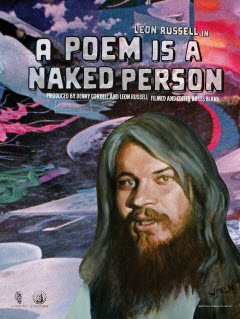 Some movies feel like symphonies or rock concerts. Some feel like comic books (or graphic novels, if you prefer). Some feel like forgotten Faulkner short stories (David Gordon Green). And yes, some rare movies feel like poems, which is not the same as movies with poetic scenes. One excellent example of movie-as-poem is Les Blank's 1974 documentary A Poem Is a Naked Person, which screened at SXSW this year -- one of its very few public screenings.
Some movies feel like symphonies or rock concerts. Some feel like comic books (or graphic novels, if you prefer). Some feel like forgotten Faulkner short stories (David Gordon Green). And yes, some rare movies feel like poems, which is not the same as movies with poetic scenes. One excellent example of movie-as-poem is Les Blank's 1974 documentary A Poem Is a Naked Person, which screened at SXSW this year -- one of its very few public screenings.
This is not your standard music biopic by any means. Descriptions of the film often note that it's about musician Leon Russell and the Oklahoma studio he built in 1972, to encourage friends to make music with him. And so it is, but don't expect a linear or straightforward story along those lines. A Poem Is a Naked Person is trying to capture the feeling of the times, a sense of being in the moment with the music rather than following an artificial narrative.
Scenes shift from a studio session to a guy painting vivid murals on swimming pool walls to a dance-hall concert to another studio session to a crowd watching a building being demolished. The movie is both hippy and dippy, in an entirely appropriate and delightful way. (Even the subtitle font is perfectly groovy.) You get to enjoy not only great musicians playing together in Russell's studio, but also everything else going on around them -- a sense of context, as opposed to talking heads telling you everything.
"Documentary" feels like both the worst word to describe this movie, as it sets expectations for a particular style of film ... and exactly the right word, because Blank has captured the time and the mood and the music and the people so perfectly. The Voice of God narrative structure would be entirely out of place here.
Ultimately, A Poem Is a Naked Person is about art everywhere you look, and what that looked like in the early 1970s -- not confined solely to Russell's musical projects. Even if you're not a huge fan of Leon Russell or the other musicians in the film, including Willie Nelson, George Jones, Ambrose Campbell, Mary Egan and Eric Andersen, you can sit back and let the music and painting and parachuting and everything else just wash over you. But you have to connect the dots yourself ... set your expectations appropriately.
SXSW Interview: Ron Nyswaner and Mary Louise Wilson, 'She's the Best Thing In It'
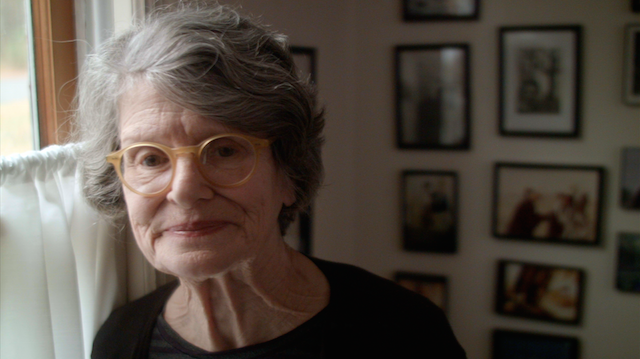
Writer/director Ron Nyswaner recently debuted his first documentary feature film at SXSW last week. She's The Best Thing In It follows famous Broadway and television actress Mary Louise Wilson as she teaches a character acting class to a group of college students in New Orleans. I had the chance to sit down with both of them to discuss acting, the filmmaking process, and what it means to live the life of an artist.
Slackerwood: Ron, you're known for these intense narrative stories (a la Philadelphia, The Painted Veil). What drew you to Mary Louise's story and, furthermore, made you decide to do it as a documentary?
Ron Nyswaner: One of the reasons is I could control every aspect of it. I've made my living for many years as a feature film writer and, unlike a playwright, the screenwriter does not often have full creative control. I was able to work with a team that helped me shoot, but a lot of times I was behind the camera, I was getting the footage. And I was ultimately the financier -- those were all my reasons for making it a doc. And Mary Louise and I have a great relationship, we both admire each other's work, and I just thought it would be great fun to work on this together.
SXSW Review: Tab Hunter Confidential
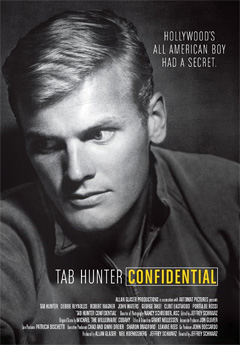 At the peak of his popularity in the 1950s and 1960s, Hollywood star Tab Hunter acted the part of the clean-cut California boy next door. But nearly 10 years ago, Hunter came out as gay. The documentary Tab Hunter Confidential, which premiered at SXSW, delves into those carefully closeted years and contrasts them with his current life, with the former teen idol himself guiding us through the narrative in a charming and heartfelt way.
At the peak of his popularity in the 1950s and 1960s, Hollywood star Tab Hunter acted the part of the clean-cut California boy next door. But nearly 10 years ago, Hunter came out as gay. The documentary Tab Hunter Confidential, which premiered at SXSW, delves into those carefully closeted years and contrasts them with his current life, with the former teen idol himself guiding us through the narrative in a charming and heartfelt way.
The movie is generally linear in its approach, a traditionally structured biography. But its subject's life is continually fascinating. For example, the sequence describing Hunter's childhood is compactly edited and doesn't feel like yet another celebrity childhood stereotype. While the film focuses on Hunter's popularity peak in the late 1950s and early 1960s, Hunter's professional and personal story continues through the present day, showing his movie-career revival in the 1980s (Polyester, Grease 2, Lust in the Dust) and his longtime relationship with Allan Glaser, one of the documentary's producers.
Perhaps if you've read Hunter's autobiography of the same name, few surprises are in store, but the film clips and interviews would still be engaging, illustrating the story of a man who's led a very complex life. Besides acting and singing, Hunter has been a competitive ice skater and throughout his life, has trained/rode horses professionally.
Filmmaker Jeffrey Schwarz (I Am Divine, Vito) has a deft touch with personal documentaries. The interviews with Hunter himself feel intimate without being intrusive. Other interviews include John Waters, Connie Stevens, George Takei, Debbie Reynolds, Clint Eastwood and ex-actress Rev. Mother Delores Hart. While the list sounds like a parade of celebrity, the interviews add insight and interest.
In addition, the archival film and TV footage in Tab Hunter Confidential is full of treasures. Many people remember Hunter at his peak as a teenage heartthrob -- can you name more than one of the movies he appeared in at that time? But he performed on TV in Playhouse 90 dramas directed by John Frankenheimer and Arthur Penn, back when such a thing was considered prestigious, highbrow fare. It's unfortunate these performances seem to be forgotten by contemporary audiences, for the most part.
SXSW Review: Kingdom of Shadows

The most haunting images in the drug war documentary Kingdom of Shadows are at the film's end. Family members of the "disappeared" -- those who have vanished amid the drug-related violence in Mexico -- stare silently into the camera, the pained but stoic looks on their faces reminding us of the drug war's human toll.
Many documentaries have chronicled the drug war in the U.S. and Mexico, but few have humanized it as poignantly as Kingdom of Shadows. While the film explains some of the politics and history of the endless battle against the drug cartels, it also puts an unforgettable face on the war's tragic effects by focusing on three people caught up in it.
The three defy stereotypes. Sister Consuelo Morales may be a petite nun in her sixties, but she's fierce and fearless in her quest to help families whose loved ones have disappeared. Based in Monterrey -- a Mexican city battered by the cartels -- and founder of the activist group Citizens in Support of Human Rights, she is unafraid to stand toe-to-toe with government officials, pressuring them to find the missing and help the families find justice.
SXSW Review: They Will Have to Kill Us First

When a film starts with a history lesson told music video-style through French-language rap, you know you're watching something unique. The impeccable sound design is the first thing I noticed about They Will Have to Kill Us First; clear gun pops accompany news reports and this introductory music. The opening sequence explains recent events in Mali that led to the split of the country and the sharia law ruling the northern section. Residents of Timbuktu and Goa became refugees in their own country as they left the violent unrest of the north to live in Bamako... or surrounding border countries such as Burkina Faso.
Among those forced to leave were many musicians, as music was banned in the north in 2012. How difficult it is to imagine a day without music -- months without it must have felt a lifetime. As famous singer Khaira Arby puts it, "Music is like oxygen for human beings." When we first see her in 2012, she seems a dimmed version of her self, distraught over the fate of her country. Filmmaker Johanna Schwartz also introduces us to the newly formed band Songhoy Blues, party musician Moussa and refugee singer Disco.
SXSW Review: KRISHA
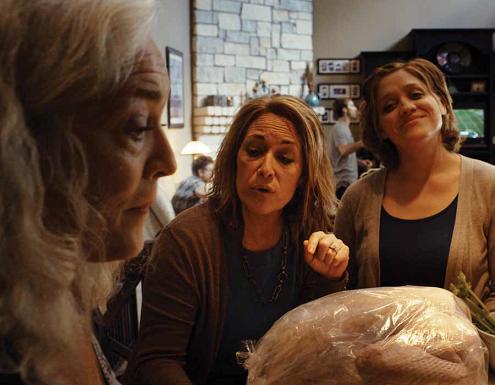
KRISHA is why we go to film festivals.
In a world full of great films that are very much alike -- even indie movies at festivals -- KRISHA rises above the been-there-seen-that noise with a truly unique style and vision. Trey Edward Shults' odd but arresting drama is a thoroughly original twist on a well-worn genre, the family holiday film.
KRISHA rose far enough above the noise at this year's SXSW Film Festival to take home the Narrative Feature Competition Grand Jury Award. Those who had the foresight and good sense to attend the film's world premiere at SXSW (which did not sell out, but should have) know it certainly deserves the honor.
Based on Shults' short film of the same title, which won the Narrative Short Special Jury Award at SXSW 2014, KRISHA is a story many of us know too well. The film's titular character arrives at a family Thanksgiving gathering after an absence of more than 10 years. Krisha (Krisha Fairchild) is a gloriously dysfunctional middle-aged woman who barely keeps it together (and frequently doesn't) while battling various inner demons.
SXSW Review: Manson Family Vacation
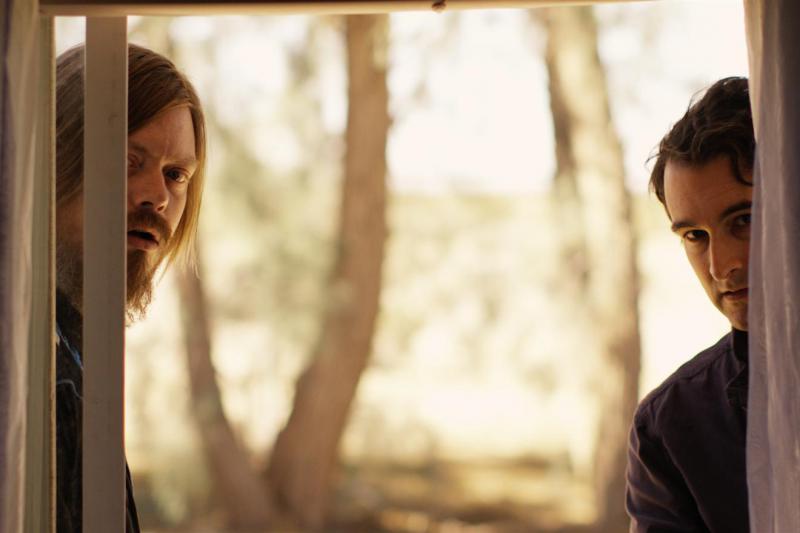
The Duplass brothers break the mold as far as family filmmaker teams go. They seem to have a knack for stories that are zany, yet peppered with flecks of true humanity. Even as producers, no two of their projects seem to be like one another. It therefore was no surprise (to me, at least) that they were part of the team behind writer/director J. Davis's premiere narrative feature film, Manson Family Vacation.
Jay Duplass takes the acting lead in this film as Nick, an anally neurotic lawyer who lives a structured life with his wife and son. When his off-the-wall adopted brother Conrad (Linas Phillips) passes through town on his way to a mysterious new job, Nick gives in to Conrad's plea of spending some quality time together. But Conrad's idea of brotherly bonding isn't quite normal: he wants to visit all of the landmarks and sites of the Charles Manson murders.
Driven by Conrad's urgent desire to start his new job with a group of "environmental activists" in the desert, the two find themselves thrown into a journey that forces them to acknowledge their estranged childhood. When Conrad's connection to Manson becomes deeper than expected, it challenges Nick to finally be the brother Conrad always sought in him, causing the story to take an unpredictable turn. (Like I said: zany with flecks of humanity.)
SXSW Review: Sir Doug and the Genuine Texas Cosmic Groove
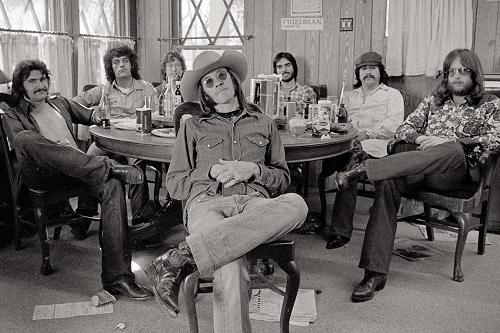
You just can't live in Texas/If you don't have a lot of soul
-- Doug Sahm, "At the Crossroads"
Sir Doug and the Genuine Texas Cosmic Groove is a groove all right, and a great tribute to one of Texas' greatest musicians.
Doug Sahm gave us "She's About a Mover" and "Mendocino" -- along with a zillion other songs -- and was an influential songwriter and performer who reinvented himself musically many times. He played in country bands as a child, cranked out Sixties pop songs with the Sir Douglas Quintet, turned psychedelic in San Francisco, helped put Austin's cosmic cowboys on the map in the Seventies, and ultimately returned to his San Antonio Tex-Mex roots with the Texas Tornadoes in the Nineties. Sahm wasn't just able to play any form of indigenous Texas music; he was Texas music.
Sir Doug celebrates all of Sahm's musical incarnations. Kicking off with a killer 1976 Austin City Limits performance of "She's About a Mover," the documentary then takes us back to Sahm's days as a child prodigy playing steel guitar in San Antonio clubs. (Known as Little Doug Sahm, he played with Hank Williams and other greats before he was a teenager.)

